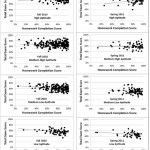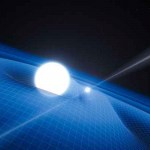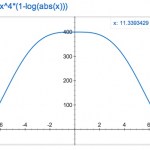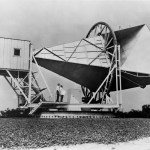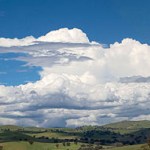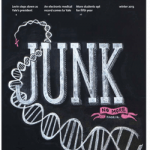Physical Sciences
We may have the answer to all of the big problems in physics! Or not.
My money is on "not".
Marcus du Sautoy, a very smart mathematician and the fellow who occupies the chair for the public understanding of science at Oxford formerly held by Richard Dawkins, made a stunning announcement.
Two years ago, a mathematician and physicist whom I've known for more than 20 years arranged to meet me in a bar in New York. What he was about to show me, he explained, were ideas that he'd been working on for the past two decades. As he took me through the equations he had been formulating I began to see…
At Scientific American's blog network, Ashutosh Jogalekar muses about the "greatest American physicist", eventually voting for Josiah Willard Gibbs, one of the pioneers of statistical mechanics. As both times I took StatMech (as an undergrad and in grad school), it was at 8:30 in the morning, I retain almost no memory of the subject, and will bow to greater experience in assessing Gibbs's importance.
I do, however, want to take issue with one thing in the post. When assessing the historical place of American physics, he writes:
Here’s my personal list for the title of greatest American…
The story of climate change has always been more of worst-case, or at least, worser-case scenarios developing and less about good news showing up out of nowhere and making us unexpectedly happy.
A few decades ago, it became clear that the release of fossil Carbon into the atmosphere primarily as CO2 was going to cause a greenhouse effect (yes, dear reader, we've known this for looooong time ... the idea that this is a recent and still untested idea is a lie you've been fed so many times some of you may have begun to believe it). At that time climate scientists thought, reasonably, that…
That naturopathy is a veritable cornucopia of quackery mixed with the odd sensible, science-based suggestion here and there is not in doubt, at least not to supporters of science-based medicine (SBM). However, what naturopaths are very good at doing is representing their pseudoscience as somehow being scientific and thus on par with actual SBM. So how do they accomplish this? Certainly, it's not through the validation of any of the cornucopia of pseudoscience and quackery that naturopaths apply to their patients as though picking "one from column A and one from column B" from a proverbial…
"I prefer to be true to myself, even at the hazard of incurring the ridicule of others, rather than to be false, and to incur my own abhorrence." -Frederick Douglass
I thought we were past this, I really did. Having grown up in New York, having lived in eight different states and traveled to 39 others -- as well as maybe a dozen different countries -- I truly thought there were a few things that were obvious. One of them, of course, is that you've got to give something a shot to know whether you like it or not. Hopefully, no matter who, where, or what you are, you'll enjoy this upbeat song by…
One of the perennial problems of teaching intro physics is getting students to do their homework, so I was very interested to see Andy Rundquist on Twitter post a link to a paper on the arxiv titled "How different incentives affect homework completion in introductory physics courses." When I shared this with the rest of my department, though, I got a link to an even more interesting paper from the same group, on the effect that doing homework has on student performance. This has an extremely surprising conclusion: for the weakest students in introductory physics, doing more homework actually…
"No valid plans for the future can be made by those who have no capacity for living now." -Alan Watts
"They do not see what lies ahead, when Sun has faded and Moon is dead." -J.R.R. Tolkien
One of the most amazing facts about the Universe is that, despite only having spent a few hundred years studying the fundamental constituents and forces of what makes us up, humanity has been able to accurately figure out just what all this actually is.
Image credit: ESO / S. Brunier.
The laws of nature are almost completely understood in a few, very important senses. We know that our…
"The views of space and time which I wish to lay before you have sprung from the soil of experimental physics, and therein lies their strength. They are radical. Henceforth space by itself, and time by itself, are doomed to fade away into mere shadows, and only a kind of union of the two will preserve an independent reality." -Hermann Minkowski
When it comes to gravity, you probably think you understand it pretty well.
Image credit: Heavens Above, via http://heavens-above.com/.
Everything with mass (or energy) attracts everything else with mass-or-energy, explaining everything from falling…
Every so often, our "friends" on the other side of the science aisle (i.e., the supporters of "complementary and alternative medicine"—otherwise known as CAM or "integrative medicine") give me a present when I'm looking for a topic for my weekly bit of brain droppings about medicine, science, and/or why CAM is neither. It's also been a while since I've written about this particular subject; so it's a win-win for all sides! I get a topic. A certain CAM journal gets extra traffic. And you get the benefit of my usually brilliant deconstruction of dubious science. What could go wrong?
In any case…
I have a son who's currently a first year physics student. As you can imagine, I occasionally pass along a link or two to him pointing to stuff on the web I think he might find particularly interesting or useful. Thinking on that fact, I surmised that perhaps other science students might find those links interesting or useful as well. Hence, this series of posts here on the blog.
By necessity and circumstance, the items I've chosen will be influenced by my son's choice of major and my own interest in the usefulness of computational approaches to science and of social media for outreach and…
"Fluoridation is the single most important commitment a community can make to the oral health of its children and to future generations." -C. Everett Koop
Most weekends, I take on a lighter topic, as a way of taking a break from the deep physics, astronomy, and science we share during the week. But every once in a while, there's an important story that needs to be told. This weekend, I invite you to enjoy Tony Rice's rendition of a fabulous Gordon Lightfoot story song,
Wreck of the Edmund Fitzgerald.
One of the most contentious issues going on in my city -- Portland, OR -- right now, is our…
"Despite its name, the big bang theory is not really a theory of a bang at all. It is really only a theory of the aftermath of a bang." -Alan Guth
So you finally understand it. The Big Bang tells us that the Universe was hotter, denser, and expanding at a faster rate in the past.
Image credit: original source unknown.
The farther back we go, the closer together everything was, the higher in temperature (and shorter in wavelength) all the radiation was, and -- of course -- the younger the Universe was.
Image credit: Ned Wright (possibly Will Kinney, too), via http://ned.ipac.…
A couple of days ago, Alom Shaha posted on the new Physics Focus blog (by the way, there's a new Physics Focus blog...) about his dissatisfaction with some popular books:
I recently read a popular science book on a topic that I felt I needed to learn more about. The book was well written, ideas were clearly explained, and I finished the book knowing a lot more about the history of the subject than beforehand. However, I don’t feel I understand the key ideas in the book any better. I won’t mention the name of the book or the author because this post isn’t really about that specific book. It’s…
"Orbiting Earth in spaceship, I saw how beautiful our planet is. People, let us preserve and increase beauty, not destroy it!" -Yuri Gagarin
Fifty-two years ago today, the first human being left Earth, and we began our journey into outer space. But back in 1961, we didn't really know how far outer space stretched, or where all the matter and energy in the Universe came from.
Image credit: NASA, 1962.
That all changed with the discovery of the Cosmic Microwave Background (by Penzias and Wilson, with the Horn Antenna, above), and subsequent measurements that led us to the Big Bang picture of…
One of the hot topics of the moment is the E. O. Wilson op-ed lamenting the way math scares students off from science, and downplaying the need for mathematical skill (this is not news, really-- he said more or less the same thing a few years ago, but the Wall Street Journal published it to promote his upcoming book). This has raised a lot of hackles in the more math-y side of the science blogosphere, while some in less math-y fields (mostly closer to Wilson's home field of evolutionary biology) either applaud him or don't see what the fuss is about.
The split, I think, comes from the fact…
If there's one thing that a certain subset of people who view themselves as reasonable and science-based don't like, it's harshness: Harshness in criticism, harshness in discussion, or—horror of horrors!—anything they view as "incivility." That's all well and good as far as it goes, but the problem is that sometimes there are things that demand a harsh response because they are just that bad. For instance, when the government spends $30 million on a clinical trial to test a wildly implausible treatment that is not without risks for no good scientific reason and no real reason other than that…
I still have spaces in this class, which is designed to help others sort out the complicated intersections of multiple crises. The class is taught by both me and my husband, Eric Woods.
This is an exciting class for us to be teaching, since it combines so many of our strengths and experiences. Eric has a Ph.d in Astrophysics from Harvard and a BA in Physics from MIT, and has been teaching environmental physics for an number of years at SUNY Albany. I'm a member of the board of the Association for the Study of Peak Oil (ASPO-USA), and a long time writer on energy, climate and…
"On what can we now place our hopes of solving the many riddles which still exist as to the origin and composition of cosmic rays?" -Victor Francis Hess
We've come a tremendously long way in our understanding of the Universe, but there are plenty of mysteries still to be revealed. Way back in the late 1800s, we noticed that there was an unaccounted-for excess in the amount of ionization in the upper atmosphere, something that our Sun and Earth, by themselves, couldn't explain.
Victor Francis Hess -- the originator of the quote atop -- decided to go see for himself, and conducted a series of…
Why is the sky blue? It's a classic question - probably the classic question of the genre of explanatory popular physics. The famous short version of the answer is that Rayleigh scattering by air molecules affects short-waveength light more than long-wavelength light, and so blue light tends to get scattered in random directions to create the diffuse blue we know and love. But like almost every answer physics can give, the answer leads to more questions. Why does Rayleigh scattering scatter short-wavelength light more strongly? This is a fairly involved question to answer from first…
There's another paper out debunking the ENCODE consortium's absurd interpretation of their data. ENCODE, you may recall, published a rather controversial paper in which they claimed to have found that 80% of the human genome was 'functional' — for an extraordinarily loose definition of function — and further revealed that several of the project leaders were working with the peculiar assumption that 100% must be functional. It was a godawful mess, and compromised the value of a huge investment in big science.
Now W. Ford Doolittle has joined the ranks of many scientists who immediately leapt…

